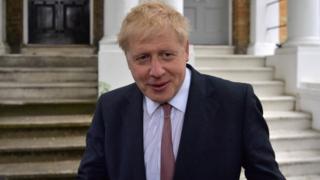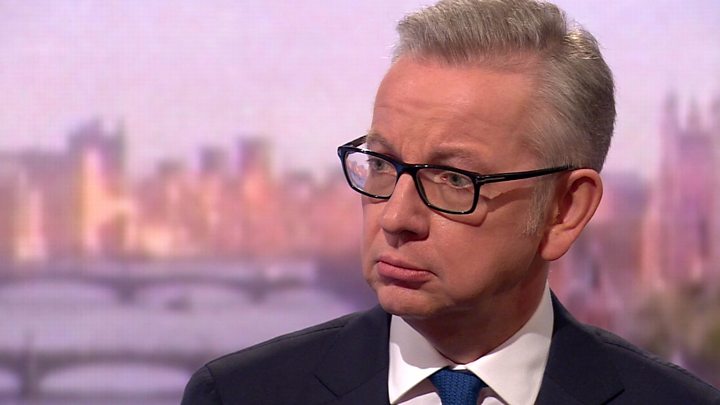Tory leadership contest: Boris Johnson pledges to cut income tax
 Image copyright DANIEL LEAL-OLIVAS/AFP/Getty Images
Image copyright DANIEL LEAL-OLIVAS/AFP/Getty Images Boris Johnson has pledged to cut income tax bills for people earning more than £50,000 a year if he wins the race to succeed Theresa May as prime minister.
The former foreign secretary told the Telegraph he would use money currently set aside for a no-deal Brexit to raise the 40% tax rate threshold to £80,000.
His promise came as Work and Pensions Secretary Amber Rudd said she believed Jeremy Hunt should be prime minister.
Tory MPs have until 17:00 BST to enter the race to become party leader and PM.
Mrs May officially stepped down as the leader of the Conservative Party last week, but will remain as prime minister until her successor is chosen.
Conservative MPs who want to replace her must have the backing of eight other party colleagues to officially enter the contest.
But Michael Gove, one of the 11 to have so far declared their intention to run, has faced calls to drop out of the race after he admitted using cocaine several times more than 20 years ago.

Media playback is unsupported on your device
Former party chairwoman Baroness Warsi said it would be “hypocrisy of the highest order” for Mr Gove to remain in the contest, after an article he wrote in 1999 in which he criticised “middle class professionals” who took drugs was republished.
Apologising on the Andrew Marr Show on Sunday, the environment secretary said he was “fortunate” to have avoided prison.
And at his campaign launch on Monday, Mr Gove is expected to insist he is “undaunted” by criticism, and will say he can both deliver Brexit and “stop Jeremy Corbyn ever getting the keys to Downing Street”.
Meanwhile, Mr Johnson told the Telegraph he planned to cut income tax bills for three million people by using money from a pot set aside by the Treasury for “fiscal headroom” in the event of a no-deal Brexit.
The paper estimates the move would cost £9.6bn a year.
“We should be raising thresholds of income tax so that we help the huge numbers that have been captured in the higher rate by fiscal drag,” Mr Johnson said.
However, Ms Rudd, leader of the centrist One Nation Conservative Caucus group and an influential voice on the Remain-supporting wing of the party, told the Times: “These are serious times and we need a respected statesman who Brussels will listen to, not more bluster.”
Launching his campaign for leader on Monday, Mr Hunt will say the challenge of Brexit calls for an “experienced, serious leader”, not the “art of empty rhetoric”.
Who will replace Theresa May?
The winner of the contest to lead the Conservative Party will become the next prime minister.
As the nominations officially open:
- Health Secretary Matt Hancock will argue he is the “fresh start” the country needs and can make the next decade the “soaring 20s”. He says he would put winning the case for capitalism at the heart of a manifesto to beat the Labour Party in a general election
- Home Secretary Sajid Javid picks up further support, with ministers Caroline Nokes and Victoria Atkins choosing to back him after Scottish Tory leader Ruth Davidson announced her support on Saturday
- Former Brexit Secretary Dominic Raab will unveil proposals to redirect £500m a year from the aid budget to create an international wildlife fund to save endangered species and habitats. “We’ve got to leave the environment in a better state than we found it,” he will say
- Mark Harper, Andrea Leadsom and Esther McVey will also launch their campaigns on Monday
- Sam Gyimah says as prime minister he would help young people get on the housing ladder by slashing stamp duty and creating at least a million new homes in five years
- Rory Stewart used a video message to insist he would not back down in his battle to become Conservative leader
BBC political correspondent Chris Mason said five of the candidates appeared to fall short of having eight supporters – the number required to put themselves forward in the contest.
However, he noted many Tory MPs had yet to declare who they were backing.
Whereas candidates in the past would have only needed two MPs supporting them, senior Tories decided to change the rules earlier this month in a bid to speed up the contest.
After nominations close, all 313 Conservative MPs will vote for their preferred candidate in a series of ballots held on 13, 18, 19 and 20 June to whittle down the contenders one by one until only two are left.
Due to another rule change, candidates will need to win the votes of at least 16 other MPs in the first ballot and 32 colleagues in the second to proceed.
If all the candidates exceed this threshold, the person with the fewest votes will be eliminated, a process that will continue in subsequent rounds until only two remain.
The final two will be put to a vote of members of the wider Conservative Party from 22 June, with the winner expected to be announced about four weeks later.
On Tuesday 18 June BBC One will be hosting a live election debate between the Conservative MPs who are still in the race.
If you would like to ask the candidates a question live on air, use the form below. It should be open to all of them, not a specific politician.
If you are reading this page on the BBC News app, you will need to visit the mobile version of the BBC website to submit your question on this topic.




